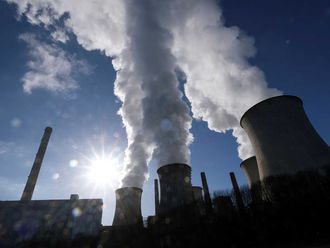Caracas: Venezuelan President Hugo Chavez said he's declaring an "economic war" against the "bourgeoisie" after business chambers criticised his handling of the economy and the performance of nationalised companies.
Chavez threatened to nationalise the country's largest food maker, Empresas Polar, saying that the company isn't "indispensable". Chavez said Polar is manipulating workers into attacking his policies and he challenged company President Lorenzo Mendoza to see who will last longer. Mendoza, Chavez said, won't get into heaven because he's wealthy.
"You've declared an econ-omic war against me, so I accept your challenge, stateless bourgeoisie," Chavez said Wednesday during a visit to a state-run vegetable oil company. "I'm declaring an economic war with the help of the people and workers. War is war, my friend. Don't complain to me later."
Chavez has nationalised companies in the oil, food, cement and metals industries as part of his push for socialism and he blames the private sector for accelerating inflation and a recession that is forecast to continue into 2011. Chavez has threatened to nationalise Polar to boost state control over the production and distribution of food, and the government seized one of the company's rice plants for three months last year.
The drive to construct a socialist economy has left the country facing international arbitration cases with ExxonMobil, ConocoPhillips and Mexican cement maker Cemex.
Chavez said Mendoza is trying to undermine his government and that the billionaire should look at Radio Caracas Television, an opposition network removed from the airwaves, as an example of an "indispensable" Venezuelan company.
Private companies exploit their workers for economic gain and sell goods at "inflated" prices, Chavez said. The bourgeoisie should read more Karl Marx, he recommended.
Contracted
Venezuela's economy contracted 5.8 per cent in the first three months of the year, the fourth consecutive quarter of declines after investment plunged and oil export revenues fell. Gross domestic product may shrink 2.5 per cent in 2010, according to the median forecast of nine banks surveyed by Bloomberg.
Business chambers Fede-camaras and Consecomercio have increased their criticism of Chavez since the first-quarter GDP report released May 25, saying his nationalisation drive has ruined the economy and that government-run companies have been unproductive.
Chavez devalued the bolivar for the first time since 2005 in January and created a multi-tiered exchange system as he struggled to close a budget deficit and slow capital flight.












